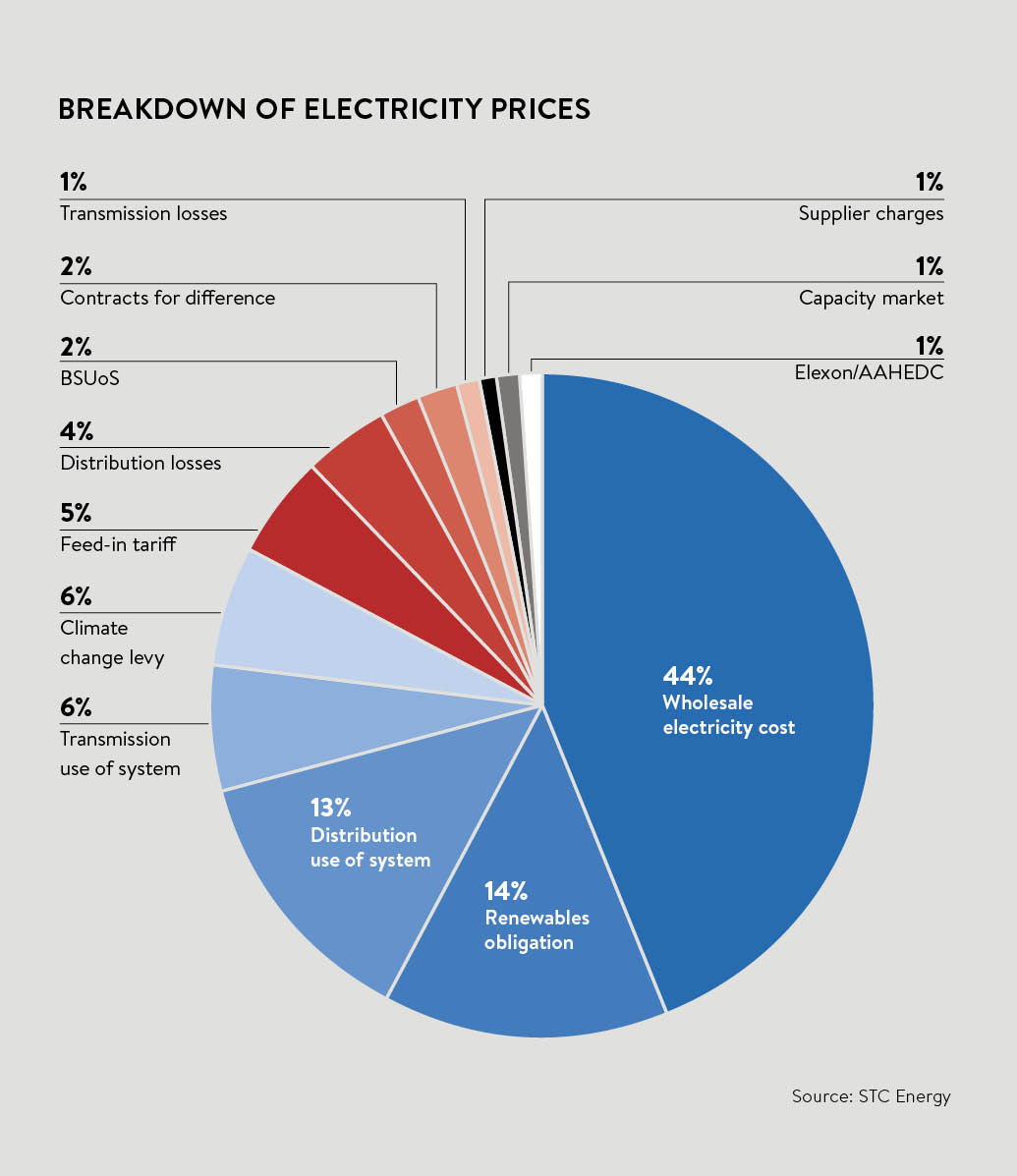CURRENT MARKET CONDITIONS
Energy commodity prices hit their lowest point at the turn of the year following the reduction in oil prices and have since risen with increased volatility. Weaker sterling, unplanned system maintenance, sooner than expected coal plant closures and a rise in oil prices have all fed into price increases in the short and long term.
At STC Energy, part of Inspired Energy plc, we encouraged our customers, who were risk averse, to forward purchase their energy contracts during this nine-year low point. Those who renewed on fixed-price contracts have benefited by securing price certainty for their entire contract. Customers that are less risk averse and chose a flexible pass-through contract will still benefit from periods of low raw energy costs, but could be exposed to some price volatility.
EXPLORING THE MARKET
With supplier costs typically representing 1 to 3 per cent of the final delivered energy spend, it makes sense to shop around and explore the whole market. We would always recommend a full market tender to the whole market, not just the big six. Results are then evaluated on cost and product functionality with a firm recommendation provided in line with the customers’ requirements.
The majority of flexible procurement frameworks only offer one energy supplier; however, at STC Energy, we believe that a choice of suppliers is imperative for increased competition and our frameworks cater for this.

OUTSOURCING UTILITIES MANAGEMENT
In addition to lowering costs through energy procurement, savings can also be made by fully validating utility invoices, streamlining invoice management and accounts payable processes. Since 2005, STC has recovered more than £142 million-worth of utility billing errors for its clients.
While bureau services create many intrinsic benefits, they also generate direct cost-saving opportunities. By employing a dedicated provider, businesses will be able to identify all billing errors and ensure that all overcharges are correctly refunded, thus saving money by outsourcing utilities management.
KNOWING YOUR PORTFOLIO
The first port of call is to establish exactly the scope of the energy and water portfolio, and create a cleansed database of all utility supply points. This in itself can highlight opportunities for savings, such as identifying non-consolidated supplies billed on default or out-of-contract rates.
ONLY PAYING FOR WHAT YOU USE
Utility suppliers’ contracts and invoices can be very complex and difficult to understand. As a result it is inevitable that some billing errors will be missed by customers. With flexible and energy-only contracts becoming a more popular way of buying energy, additional validation is required to balance reconciliation statements from suppliers and check the growing number of third-party charges.
In STC’s experience, between 3 and 5 per cent of utility expenditure can be saved by fully validating supplier invoices. Further savings can also be achieved by reducing time spent by internal staff dealing with utility issues. This type of saving can often outweigh the cost of an energy bureau service, which should equate to less than 0.5 per cent of total utility expenditure.

Alan Little
Business development manager STC Energy
FASTER SOLUTIONS, ACCURATE RESULTS
Switching from paper to electronic billing and using a system that can import and validate invoice files provides a much more efficient way of processing utility invoices. Validated invoices can be automatically compiled into consolidated accounts payable files and loaded directly into accounting software. This process further reduces the time internal staff spend processing invoices and also ensures duplicate or incorrect payments are eliminated.
HIGHLIGHTING WASTAGE
To combat energy waste and other exceptional consumption, STC recommends setting consumption targets and undertaking proactive monitoring of individual supplies using traffic-light reporting and profile alerts. Dedicated software can form a picture of a site’s consumption profile, which is then automatically monitored for exceptions. Any deviations trigger an e-mail alert and can be viewed on map-based site exception dashboards. Reports quickly highlight which sites are over target, allowing for fast corrective action.
Profile alerts are very successful in identifying energy waste directly and in suggesting behavioural changes that can be implemented to reduce wastage.
AVOIDING PEAK TIMES
With the introduction of the capacity market, reducing energy usage during peak times is crucial. Our analysis of profile data can assist with identifying periods of consumption that could be reduced during peak times. Peak times are typically 4pm to 7pm, Monday to Friday business days between November and February. However, peak times can vary by region.
STAYING COMPLIANT
Although the CRC energy efficiency scheme is nearing its demise in 2019, annual returns and audits will still be required. Savings can be made by ensuring that estimated invoices are kept to a minimum by using profile data and automatic or self-read meter readings. This will save an uplift of 10 per cent on estimated data when purchasing allowances.
The energy market can be complicated, but with the right energy partner it can be much easier to navigate
Finally, like any commodity market, wholesale energy prices can go up and down having an impact on costs. So cost difference between supplier offers is not only due to supplier and consultant margins, but also product type and structure. Innovative product ranges, procurement solutions and added-value services have become more vital in today’s competitive market. The energy market can be complicated, but with the right energy partner it can be much easier to navigate.
Using a third-party intermediary, further savings can be achieved by implementing some or all of these recommendations.
If you would like to find out more about how STC Energy can help you, get in touch today.
For solutions and services that work use STC Energy
Call us on 0208 466 2915
E-mail us on [email protected]
www.stcenergy.com


